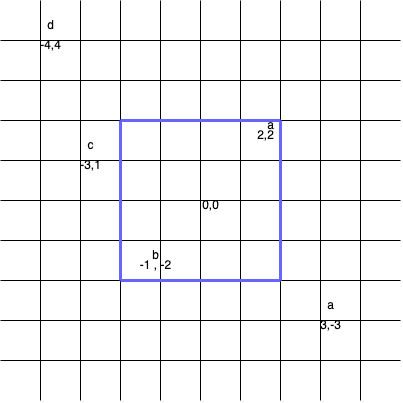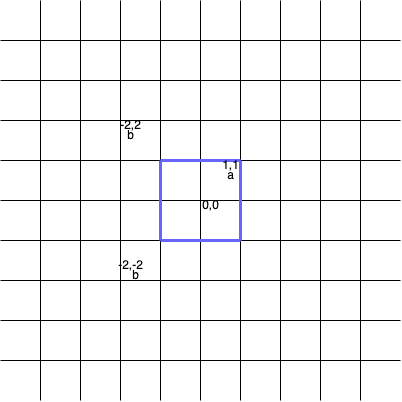Maximum Points Inside the Square
MediumUpdated: Aug 2, 2025
Practice on:
Problem
You are given a 2D**** array points and a string s where, points[i]
represents the coordinates of point i, and s[i] represents the tag of point i.
A valid square is a square centered at the origin (0, 0), has edges parallel to the axes, and does not contain two points with the same tag.
Return the maximum number of points contained in a valid square.
Note:
- A point is considered to be inside the square if it lies on or within the square's boundaries.
- The side length of the square can be zero.
Examples
Example 1

Input: points = [[2,2],[-1,-2],[-4,4],[-3,1],[3,-3]], s = "abdca"
Output: 2
Explanation:
The square of side length 4 covers two points `points[0]` and `points[1]`.
Example 2

Input: points = [[1,1],[-2,-2],[-2,2]], s = "abb"
Output: 1
Explanation:
The square of side length 2 covers one point, which is `points[0]`.
Example 3
Input: points = [[1,1],[-1,-1],[2,-2]], s = "ccd"
Output: 0
Explanation:
It's impossible to make any valid squares centered at the origin such that it
covers only one point among `points[0]` and `points[1]`.
Constraints
1 <= s.length, points.length <= 10^5points[i].length == 2-10^9 <= points[i][0], points[i][1] <= 10^9s.length == points.lengthpointsconsists of distinct coordinates.sconsists only of lowercase English letters.
Solution
Method 1 – Binary Search with Hashing
Intuition
We want to find the largest square (centered at the origin) that contains the maximum number of points, with the restriction that no two points inside the square have the same tag. Since the square is axis-aligned and centered at (0,0), we can use binary search on the possible side length, and for each candidate, check if it's possible to select points with unique tags inside the square.
Approach
- Define a helper function to check if a square of side
2 * d(from-dtod) can contain a set of points with unique tags. - Use binary search on
d(the half-side length) from 0 up to the maximum absolute coordinate inpoints. - For each
d, collect all points within the square and check if their tags are unique (using a set or map). - Track the maximum number of unique-tagged points found for any valid
d. - Return the maximum number found.
Code
C++
class Solution {
public:
int maxPointsInsideSquare(vector<vector<int>>& points, string s) {
int n = points.size();
int l = 0, r = 0, ans = 0;
for (auto& p : points) r = max(r, max(abs(p[0]), abs(p[1])));
while (l <= r) {
int d = (l + r) / 2;
unordered_set<char> tags;
int cnt = 0;
bool valid = true;
for (int i = 0; i < n; ++i) {
if (abs(points[i][0]) <= d && abs(points[i][1]) <= d) {
if (tags.count(s[i])) { valid = false; break; }
tags.insert(s[i]);
cnt++;
}
}
if (valid) {
ans = max(ans, cnt);
l = d + 1;
} else {
r = d - 1;
}
}
return ans;
}
};
Go
func maxPointsInsideSquare(points [][]int, s string) int {
n := len(points)
l, r, ans := 0, 0, 0
for _, p := range points {
if abs(p[0]) > r { r = abs(p[0]) }
if abs(p[1]) > r { r = abs(p[1]) }
}
for l <= r {
d := (l + r) / 2
tags := make(map[byte]bool)
cnt := 0
valid := true
for i := 0; i < n; i++ {
if abs(points[i][0]) <= d && abs(points[i][1]) <= d {
if tags[s[i]] { valid = false; break }
tags[s[i]] = true
cnt++
}
}
if valid {
if cnt > ans { ans = cnt }
l = d + 1
} else {
r = d - 1
}
}
return ans
}
func abs(x int) int { if x < 0 { return -x }; return x }
Java
class Solution {
public int maxPointsInsideSquare(int[][] points, String s) {
int n = points.length, l = 0, r = 0, ans = 0;
for (int[] p : points) r = Math.max(r, Math.max(Math.abs(p[0]), Math.abs(p[1])));
while (l <= r) {
int d = (l + r) / 2;
Set<Character> tags = new HashSet<>();
int cnt = 0;
boolean valid = true;
for (int i = 0; i < n; ++i) {
if (Math.abs(points[i][0]) <= d && Math.abs(points[i][1]) <= d) {
if (tags.contains(s.charAt(i))) { valid = false; break; }
tags.add(s.charAt(i));
cnt++;
}
}
if (valid) {
ans = Math.max(ans, cnt);
l = d + 1;
} else {
r = d - 1;
}
}
return ans;
}
}
Kotlin
class Solution {
fun maxPointsInsideSquare(points: Array<IntArray>, s: String): Int {
var l = 0
var r = 0
var ans = 0
for (p in points) r = maxOf(r, kotlin.math.abs(p[0]), kotlin.math.abs(p[1]))
while (l <= r) {
val d = (l + r) / 2
val tags = mutableSetOf<Char>()
var cnt = 0
var valid = true
for (i in points.indices) {
if (kotlin.math.abs(points[i][0]) <= d && kotlin.math.abs(points[i][1]) <= d) {
if (tags.contains(s[i])) { valid = false; break }
tags.add(s[i])
cnt++
}
}
if (valid) {
ans = maxOf(ans, cnt)
l = d + 1
} else {
r = d - 1
}
}
return ans
}
}
Python
class Solution:
def maxPointsInsideSquare(self, points: list[list[int]], s: str) -> int:
l, r, ans = 0, 0, 0
for x, y in points:
r = max(r, abs(x), abs(y))
n = len(points)
while l <= r:
d = (l + r) // 2
tags = set()
cnt = 0
valid = True
for i in range(n):
if abs(points[i][0]) <= d and abs(points[i][1]) <= d:
if s[i] in tags:
valid = False
break
tags.add(s[i])
cnt += 1
if valid:
ans = max(ans, cnt)
l = d + 1
else:
r = d - 1
return ans
Rust
impl Solution {
pub fn max_points_inside_square(points: Vec<Vec<i32>>, s: String) -> i32 {
let mut l = 0;
let mut r = 0;
let mut ans = 0;
for p in &points {
r = r.max(p[0].abs()).max(p[1].abs());
}
let n = points.len();
let s = s.as_bytes();
while l <= r {
let d = (l + r) / 2;
let mut tags = std::collections::HashSet::new();
let mut cnt = 0;
let mut valid = true;
for i in 0..n {
if points[i][0].abs() <= d && points[i][1].abs() <= d {
if tags.contains(&s[i]) { valid = false; break; }
tags.insert(s[i]);
cnt += 1;
}
}
if valid {
ans = ans.max(cnt);
l = d + 1;
} else {
r = d - 1;
}
}
ans
}
}
TypeScript
class Solution {
maxPointsInsideSquare(points: number[][], s: string): number {
let l = 0, r = 0, ans = 0;
for (const [x, y] of points) r = Math.max(r, Math.abs(x), Math.abs(y));
const n = points.length;
while (l <= r) {
const d = Math.floor((l + r) / 2);
const tags = new Set<string>();
let cnt = 0;
let valid = true;
for (let i = 0; i < n; ++i) {
if (Math.abs(points[i][0]) <= d && Math.abs(points[i][1]) <= d) {
if (tags.has(s[i])) { valid = false; break; }
tags.add(s[i]);
cnt++;
}
}
if (valid) {
ans = Math.max(ans, cnt);
l = d + 1;
} else {
r = d - 1;
}
}
return ans;
}
}
Complexity
- ⏰ Time complexity:
O(n log M), wherenis the number of points andMis the maximum absolute coordinate value. Each binary search step checks all points. - 🧺 Space complexity:
O(n), for the set of tags in the worst case.